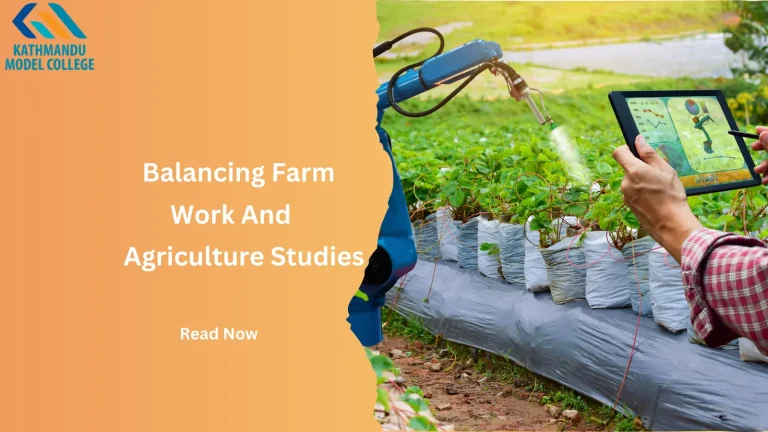
BSc.Agriculture v/s Diploma in Agriculture: A Comparative Guide
Nepal is an agricultural country- it is a fact we have always known, but the thought of pursuing agriculture as a career with proper academics was never thought about.
But with the tides changing, people are slowly realising that agriculture can be pursued as a successful career with proper academics and a modern and scientific approach.
Currently, there are two options available for students who wish to study agriculture in Nepal: the first one being getting a Bachelor’s degree in Agriculture, and the second being getting a diploma in Agriculture, both of which present as good options.
If you are a student aspiring to study agriculture and are unsure about which option will be the right one for you, this post will help you decide.
Read more about BSc. Agriculture in Nepal: Course Overview, Admission Process, Duration & Curriculum
Bachelor’s in Agriculture
The Bachelor in Agriculture is a four-year undergraduate degree that provides students with in-depth knowledge of modern agriculture, covering subjects such as crop science, soil science, horticulture, animal science, agribusiness, and agricultural technology.
The objective of this program is to prepare students for professional roles in research, farm management, agribusiness, government agencies, NGOs, and further studies like a Master’s in Agriculture.
It is offered by:
- Tribhuvan University
- Agriculture and Forestry University
- Kathmandu University
- Purbanchal University
- Far Western University
- Mid-Western University
- Madhesh Agricultural University
- Rajarshi Janak University
Diploma in Agriculture
A Diploma in Agriculture is a three-year technical course that provides practical, hands-on training in farming, livestock management, crop production, and basic agricultural techniques.
It is especially targeted for students who want to quickly enter the workforce as a technician, farm supervisor, or agricultural assistant.
Institutions, affiliated with the Council for Technical Education and Vocational Training (CTEVT) that provide this course are:
- Dhading Polytechnic School
- Jiri Technical School
- Karnali Technical School
- Kisan Polytechnic Institute
- Madan Bhandari Memorial Academy
- Ratna Kumar Bantawa Polytechnic Institute
- Sailaja Acharya Memorial Polytechnic
- Seti Technical School
Learn more about BSc. CSIT or BCA – Which Is Better for an IT Career in Nepal?
Comparing the two courses
Here is a comparison between the two programs:
BSc.Agriculture | Diploma in Agriculture | |
Level | Undergraduate (Bachelor’s Degree) | Technical diploma |
Duration | 4 years | 3 years |
Elgibility | Must have completed +2 in the science stream or equivalent | Must have completed Secondary Education Examination |
Course Focus | In-depth study of agriculture, crop science, animal science, agribusiness, research, and technology | Practical knowledge of farming, livestock, crop production, and basic agricultural techniques |
Curriculum Depth | Advanced and research-oriented, and combines theory with fieldwork | More skill-based and focused on technical and hands-on training |
Skills Developed | Research, agribusiness management, farm management, scientific analysis, policy understanding | Practical farming techniques, crop and livestock management, basic agri-extension |
Career Opportunities | Agricultural officer, researcher, agribusiness manager, lecturer, NGOs, INGOs, government jobs | Junior Technician, assistant in agricultural projects, farmer, farm supervisor, and more traditional roles |
Further Studies | Eligible for a Master’s in Agriculture, Plant Science, Animal Science, and other related programs | Can pursue or upgrade to a BSc.Agriculture after meeting entry requirements |
Recognition | National and international recognition | Recognized for technical-level jobs in Nepal and limited scope abroad |
Which one should you choose?
The right choice for you depends on your own situation.
BSc.Agriculture can be the right choice for you if:
- You are interested in modern farming techniques and food production.
- You are passionate about sustainable agriculture and rural development.
- You are someone who enjoys science, technology, and innovation in agriculture.
- If you are aiming for a career in agricultural research and development.
- If you intend to work in agribusiness, NGOs, or government agencies.
- If you want to contribute to food security and community development.
- You want to pursue higher studies and academics in the field of agriculture and eventually get a master’s or doctoral degree.
- If you are looking for a degree that will provide stable career prospects in Nepal and abroad in the agricultural sector.
You should consider studying the Diploma of Agriculture if:
- You want to start your career quickly in the agricultural field.
- You are interested in practical, hands-on training in farming and livestock.
- You prefer technical and skill-based education rather than theory-heavy courses.
- Your aim is to work as a farmer, farm supervisor, technician, or agricultural assistant.
- You plan to further your studies and get a Bachelor’s Degree in the future, but it is not a priority for now.
- You are passionate about improving farming practices in rural communities.
- You are seeking affordable education and faster employment opportunities.
- You want to contribute as a grassroots-level agricultural worker in Nepal.
Future Prospects
BSc.Agriculture and Diploma in Agriculture set the setting stone for various opportunities in Nepal’s growing agricultural sector, but the level and type of prospects are different.
Learn more about How to Prepare for Chartered Accountancy (CA) After +2 and the Cost of Study
BSc Agriculture Graduates
Graduates of BSc Agriculture have a wide range of opportunities.
You are able to work in government agencies like the Ministry of Agriculture and Livestock Development, research institutions, NGOs, and international organizations that focus on food security and sustainable farming.
You can also pursue a career in agribusiness, agricultural technology, seed companies, fertilizer and pesticide industries, and farm management.
You also have the option to pursue higher studies either in Nepal or abroad, enhancing your career prospects even more.
There is a growing demand for agricultural experts in Nepal as well as globally, and you can find jobs both nationally and internationally.
Diploma in Agriculture Graduates
Once you graduate from this course, you have strong prospects at the grassroots level.
You can work in the role of a junior technician, agricultural extension worker, farm supervisor, or livestock manager.
Most of the graduates are given opportunities in rural municipalities, cooperatives, community projects, and local NGOs, where they can play a crucial role in supporting farmers directly.
With the diploma, you can also start your own farm or agribusiness ventures, using the practical skills learnt.
You can also further your education in the future by enrolling in a Bachelor’s program.
Read more on Bachelor of Architecture in Nepal: Course Overview and Scope
Conclusion
Coming to a conclusion, both BSc.Agriculture and Diploma in Agriculture are great study options in Nepal, but are designed for different needs and career goals.
BSc.Agriculture is the more suitable choice for you if you are looking for advanced knowledge, higher studies, research opportunities, and leadership roles in agriculture and related fields.
A Diploma in Agriculture, on the other hand, will better fit your needs if you are seeking practical skills, quicker employment, and grassroots-level impact in farming communities.
Making a choice between the two depends solely on your interest, financial situation, strengths, weaknesses, and long-term career aspirations.
Despite your choice among the two, there is no doubt you will surely be contributing to the agricultural sector of Nepal, strengthening it and moving it towards a sustainable future.

























